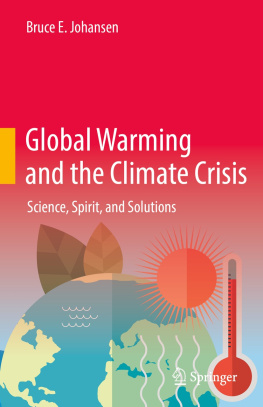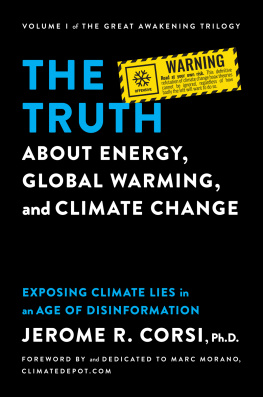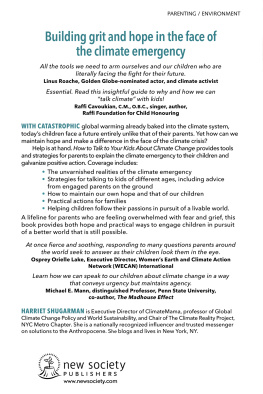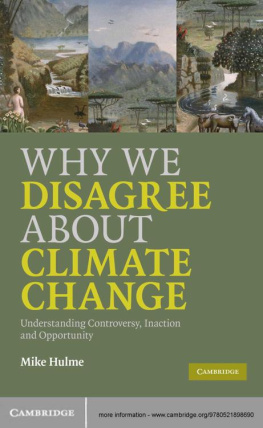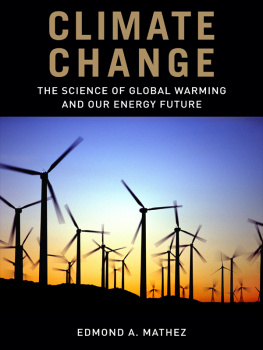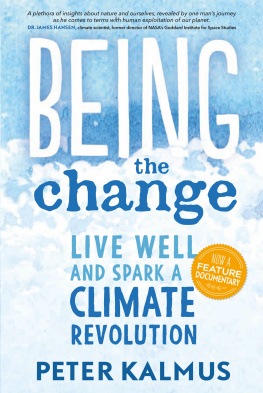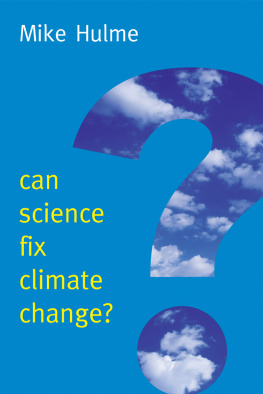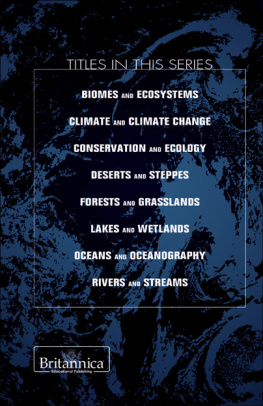Contents
Page List
Guide

Beyond climate grief
D R J ONICA N EWBY is a science reporter, author, TV presenter and director best known for her two decades on ABC TVs popular weekly science program, Catalyst. She has twice won the Eureka Award, Australias most prestigious science journalism prize, and is a recipient of a World TV Award.
Originally trained as a veterinarian, Jonica took her love of animals, biology, neuroscience and psychology into the field of science communication. Her first book, The Animal Attraction, charted how our domestic animal companions made modern civilisation possible. It became a TV series that launched her science broadcasting career.
Since then, Jonica has established a reputation for presenting stories with a rare honesty and intimacy. She shared her partners cancer struggles for a feature on cancer and exercise, broke taboos discussing the science of the female sex drive, and jumped out of a plane to demonstrate how parts of our brain shut down during danger.
When not in her beloved snow country, Jonica lives on the New South Wales south coast with ABC Science Show presenter Robyn Williams AO and far too many parrots.
Jonica Newby
Beyond
climate
grief
A journey of love, snow, fire
and an enchanted beer can

A NewSouth book
Published by
NewSouth Publishing
University of New South Wales Press Ltd
University of New South Wales
Sydney NSW 2052
AUSTRALIA
newsouthpublishing.com
Jonica Newby 2021
First published 2021
This book is copyright. Apart from any fair dealing for the purpose of private study, research, criticism or review, as permitted under the Copyright Act, no part of this book may be reproduced by any process without written permission. Inquiries should be addressed to the publisher.

| A catalogue record for this
book is available from the
National Library of Australia |
ISBN9781742236834 (paperback)
9781742245171 (ebook)
9781742249735 (ePDF)
Internal design Josephine Pajor-Markus
Cover design Debra Billson
Cover illustration Debra Billson. Includes elements from Child holding balloons standing in front of fantasy storm by Tithi Luadthong, Shutterstock, and Sofiyka4, 123Rf.
All reasonable efforts were taken to obtain permission to use copyright material reproduced in this book, but in some cases copyright could not be traced. The author welcomes information in this regard.
This book is printed on paper using fibre supplied from plantation or sustainably managed forests. The cover includes a varnish coating to avoid the use of plastic.

Contents
I acknowledge the hospitality and knowledge of the traditional custodians of the lands on which much of this book is set, Ngarigu, Gadigal, Dharawal, Dhurga, Dyirringan, Thawa, Bidhawal, and pay my respect to Elders past, present and future.
You dont have to experience grief,
but you can only do so by avoiding love.

David Kessler,
who famously helped define the five stages of grief:
denial, anger, depression, bargaining, acceptance.
I started this book in one voice and finished it in another. I started this book in one world and finished it in this one.
When I set out in October 2019, I had a clear enough plan. But within weeks, our world began to slide deeper and deeper into an altered state as nature hit us with first one then two black swan events: biblical events of fire and plague. The book and I had to change with it, but the theme, of how we deal emotionally with the climate-induced changes ahead, could not have become more starkly, viscerally relevant.
But Im ahead of myself. Let me begin with the trigger, the incident that compelled me onto the personal quest that became this book.
My birthday was exactly one week after the 2019 Australian federal election. Having invited six friends to dinner that night, I finished shopping and sent a quick reminder text covered in smiley faces and champagne emojis. A text pinged back. Sorry cant, Ive got the flu. Another ping. So sorry, I forgot your birthday. After the election, I just had to get away. I need time out so not calling anyone. Ill give you a bell next week. Have a great night.
My first thought was, Louisa, how could you? What about all this gluten-free food? The second thought was genuine sympathy. I got it. Louisa, who had taken her dogs and run for solitude after the election, was just as sick as my friend with the flu. She was suffering an acute case of climate grief.
I too had felt ill on the night of Saturday, 18 May 2019. Late in the evening, I started to shake, and then I started to cry. I could not stop crying. For half an hour the soul sobs just kept on coming. I was at my little beach cottage on the south coast of New South Wales with my long-time partner Robyn Williams, and when I walked out onto the deck to be under the stars he came and held me hard, comforting himself as much as me while I sobbed as if someone dear had died.
It would be fair to say this was a pretty extreme reaction to an election. Im not young, Ive seen elections before. And I genuinely believe that in Australia, the regular yin and yang fluctuations of government have served us pretty well over the years. No, this grief these soul-wrenching sobs wasnt about politics. This was about climate. This was a moment when hope hope Id subconsciously held for months if not years was dashed against cliffs of helplessness. In another year of floods and droughts and other climate disasters, had Australians really voted against taking any meaningful action on climate?
Despite my years as a science reporter, climate grief is a term I only heard for the first time in 2018. Id seen it in the eyes of many of the scientists Id interviewed around that time. More and more were falling prey to it as the predictions from increasingly accurate modelling turned from worrying to alarming. In late 2018 I was hit hard by it myself, to the point where I visited my doctor seeking antidepressants.
Anger, denial, depression, hope, more anger, sadness, determination. A roller-coaster of emotions, and Id felt all of them. If Im struggling with climate grief, I wondered, how is everyone else doing? What should parents tell anxious kids? Whats it like for scientists? Worse still, coral scientists? How about farmers? How are the kids themselves managing all this news? How can we live a good and happy life under the weight of this fearsome knowledge?
This is what came to me on that strange birthday: we have yet to address the scale of our collective emotional responses to global warming. We are hitting some sort of threshold, and we could do with some help.
What helped me was the realisation that these were emotions of grief, and to accept them before supplementing them with others: humour, courage, joy. And, above all, love. My breakthrough? When I realised that you can love a place as much as you love a person. It struck me suddenly how similar my feelings were to when Robyn had cancer a couple of years before. There were points when I couldnt know if the outcome would be life or death for him. Bravery was needed then. Fear and pain overwhelmed sometimes. But you keep going. Because while theres life theres love and theres always, always hope.


